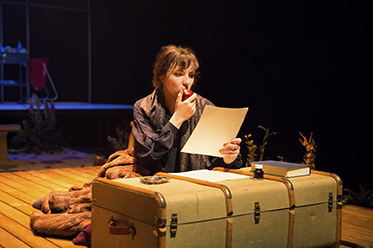 From the moment you enter the theatre, you’ll be charmed by the scenic design. The audience are seated around a stone garden bed: an Eden with budding flowers, steppingstones, ponds, and a garden seat. Elevated behind this, is a separate scene, a sterile hospital room. The yellow of the hazardous material containers, and the red clinical waste disposal bag, the only colours in this white world.
From the moment you enter the theatre, you’ll be charmed by the scenic design. The audience are seated around a stone garden bed: an Eden with budding flowers, steppingstones, ponds, and a garden seat. Elevated behind this, is a separate scene, a sterile hospital room. The yellow of the hazardous material containers, and the red clinical waste disposal bag, the only colours in this white world.
Cleverly created by set designer Martelle Hunt, when put side-by-side in this way, the differences between theses two spaces extend far beyond one being indoors, and the other outdoors. Contextually, the garden could be of any time, whereas the heart rate monitor, the metal-framed bed and the intravenous drip are all hallmarks of a hospital you would visit today. The garden is also living and breathing, whereas the lifeless patient occupying the hospital bed, with a face wrapped in bandages, is far from blossoming.
The effectiveness of the design is key in The Rivers of China, as the play contains two storylines, each of different times and places.
The first story takes the audience back to the 1920’s, in Fontainebleau. New Zealand born short-fiction writer Katherine Mansfield (Alexandra Aldrich), has travelled from the UK to attend a spiritual sanatorium in hope of curing her tuberculosis.
Run by the influential Russian mystic healer Georgei Gurdjieff (Rob Meldrum), Mansfield is instructed on how to develop a more conscious mind, through a series of lectures, manual labour and physical exercise. Gurdjieff’s methods, as well as his opinion of women are questionable, particularly for Mansfield who is more modernist in her views of gender, religion, disease, and the importance of intellect. The scenes – and standoffs – between these two are the most compelling in the play.
The second story is set in contemporary Melbourne, where the traditional gender roles have reversed. Women wear the pants, while men are mopping the floors and getting their hearts broken. When an unidentified male patient (James Cook) wakes from surgery believing he is Katherine Mansfield, drama and confusion between the hospital staff and this hypnotised character ensues.
Though answers are given to the audience, the social context of this unusual case of mistaken identity, and the motivations of the Frankenstein who created it, seemed to get lost in the delivery. There are scenes between the two female doctors, and a rather macabre opening of the second act, which were supposed to offer some insight into what was happening between men and women in this society, but they didn’t translate easily to the audience.
Instead, the unlikely connection between this patient, who thinks he’s Mansfield and the hospital janitor who likes to write poetry, becomes the primary focus of this story. The tenderness with which this carer helps the unknown man is endearing to watch, and the climax of the play is particularly poignant.
First staged in the 1980s, this play, written by Australian dramatist Alma De Groen, has stood the test of time both conceptually and thematically. The quality of this production by independent theatre company Don’t Look Away is very solid, particularly across all theatrical elements including sound and lighting design. Though the performances vary in terms of strength, Alexandra Aldrich is outstanding, displaying full commitment to her portrayal of Katherine Mansfield.
The Rivers of China
Theatre Works, 14 Acland St, St Kilda
Season continues to 30 May 2015
Bookings: (03) 9534 3388 or online at: www.theatreworks.org.au
For more information, visit: www.theatreworks.org.au for details.
Image: Alexandra Aldrich in The Rivers of China – photo by George Darsas
Review: Thomas Jones
Thomas Jones has gained extensive experience over the past seven years both in the UK and Australia working as an editor for Australian Times, and a freelance reviewer for Everything Theatre and FilmDude. He was also an assessor for the Off West End Theatre Awards known as The Offies, and created KangRooviews – a website promoting Australian performing arts in the UK.
